Helen H. Moore's Blog, page 225
November 29, 2017
The human faces of climate change

Filmmaker Dayna Reggero (Credit: Andrea Desky)
 When I arrive at award-winning chef Katie Button’s downtown Asheville restaurant, Cúrate, Dayna Reggero greets me with a hug before I even have the chance to properly introduce myself. I apologize for being a few minutes late, glance down at my phone to see that I’m actually on time, and then she quickly notes, “I’m always early.”
When I arrive at award-winning chef Katie Button’s downtown Asheville restaurant, Cúrate, Dayna Reggero greets me with a hug before I even have the chance to properly introduce myself. I apologize for being a few minutes late, glance down at my phone to see that I’m actually on time, and then she quickly notes, “I’m always early.”
It’s hard to pinpoint if the 10-minute walk from my car to the restaurant, in the out of place 70-degree heat for October, is the reason why I feel so warm, or if it’s simply Reggero’s presence. She immediately begins telling me her favorite dishes, and as I look down at my menu, I notice someone has drawn stars beside certain items. She casually drops, “I had the waiter mark the dishes you could eat or ones they could at least make accessible for your dietary restrictions. That’s also why I came a few minutes early.” I think I’m able to identify that warm feeling now.
By trade, Reggero is an environmentalist. Her work spans over two decades and ranges from filmmaking to beginning her career as a spokesperson. However, her most skilled work might come in the form of organizing conversations, or simply starting them. Her most recent work, “The Climate Listening Project,” is a docu-series that has partnered with Moms Clean Air Force, National Audubon Society, Natural Resources Defense Council, Cultivating Resilience, Green Chalice and The Collider.
The series takes viewers to different communities within the United States, and as Reggero describes, “We’re not trying to convince anyone that climate change is real, we just want to show the real people impacted by climate change and the real people creating solutions.” And showing off real people is what she is all about. “I haven’t agreed to interviews in a long time. If I’m asked, I’m always certain there is someone better to connect with or someone who can provide exciting insight, so I tend to direct whomever requested an interview to them.”
Reggero’s journey to lending her voice and skills to change goes beyond connecting people. Her activism and eager spirit to bring awareness to issues has always been inside of her. After completing her undergraduate studies in communications at the University of West Florida and her Masters in applied science at the University of Denver, Reggero’s first job out of school was to help implement a triple bottom line greening for Fort Bragg communities in North Carolina with help from the Pentagon and U.S. Army. She found the connection between bettering the environment and helping a community long-term to be an equally exciting and rewarding opportunity. Reggero went on to promote clean energy with the Sierra Club’s Beyond Coal campaign and helped Chimney Rock State Park become Green Certified by the North Carolina Department of Environment and Natural Resources.
A native of New York, Reggero found a sense of comfort and peace in the Blue Ridge Mountains of North Carolina and moved onto a large plot of land in the hills with her husband and Great Dane, Centaur. But while Reggero is nestled into her little piece of paradise, she’s well-traveled and well-versed in the way in which climate change is impacting communities near and far.
Her work with “The Climate Listening Project” features two women in Stokes County, N.C., who are using their local resources and their voices to fight against the harmful effects of coal ash and fracking. The project traveled as far as Belize to study the Wood Thrush bird, who spend their summers breeding and living in the eastern United States but migrate south and directly back to the east coast every year. The film recently took home a Best Short Documentary win at the 2017 Belize International Film Festival. Her other recent work has included launching Woody Harrelson’s Step Forward Paper in the United States and coordinating with Ian Somerhalder and the Ian Somerhalder Foundation during the “Years of Living Dangerously.”
“Connecting the science to the people is my ultimate goal,” she said. “If I can help accelerate the conversation in any way, I’ll feel like I’m doing something right.”
With the ever-growing number of women working in male-dominated fields such as film and science, Reggero is further evidence that you can show up and be the best person for the job and just happen to be female. “Every woman who succeeds where women haven’t succeeded before is a win, and I just want to keep that momentum going.”
As our lunch conversation concludes, my body temperature has returned to normal, but Reggero’s energy is at full speed. Her eagerness to continue connecting the dots for anyone and everyone is on full display, and even our waiter extends a formal greeting and thank you to her as we exit. As I return home and crack open my notes, I notice the word “cherish” has been written several times throughout the pages of dialogue I transcribed. And simply put, that has to be the best way to describe Reggero. She cherishes everyone, everything, and if you’re lucky enough to spend time with her, you too will cherish that.
Nobel-winning economist Joseph Stiglitz warns of Bitcoin bubble
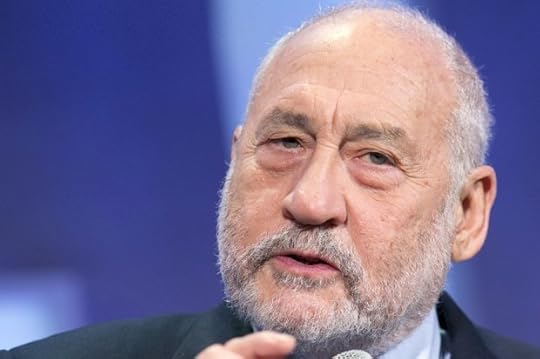
Joseph Stiglitz (Credit: AP/Mark Lennihan)
Less than 24 hours after trading at $10,000 per coin, Bitcoin continued its upward streak and surpassed $11,000 on Wednesday, while a Nobel Memorial Prize-winning economist sounded investor alarm bells over what may be a bubble waiting to burst.
In an interview on Bloomberg, economist Joseph Stiglitz was asked if Bitcoin, the best-known cryptocurrency, could be “viable” if it were regulated. Stiglitz pointed out that “one of the main functions of government is to create currency.” He explained that Bitcoin is “successful only because of its potential for circumvention, lack of oversight,” referencing the fact that, as a cryptocurrency, the distribution of Bitcoin is decentralized with no central bank to mint or manage the currency.
“It’s a bubble that’s going to give a lot of people a lot of exciting times as it rides up and then goes down,” Sitglitz told Bloomberg News.
He added, “so it seems to me it ought to be outlawed. It doesn’t serve any socially useful function.”
“The value of a Bitcoin today is expectations of what the Bitcoin is going to be tomorrow,” Stiglitz said.
But Stiglitz did argue that “the medium of exchange that we use for transaction” should be brought up to date. “Let’s move away from paper, into the 21st century of a digital economy,” he said.
Bitcoin has risen tenfold this year, the “largest gain of all asset classes,” according to The Guardian.
“The madness of crowds is well documented, but it is quite something to behold in the flesh. It’s hard to keep up with this – bitcoin just flew past the $11,000 mark, leaping $200 in barely five minutes before taking another big leg higher,” Neil Wilson, a senior market analyst at ETX Capital, told The Guardian.
Wilson added, “It’s up more than 14% today alone and the year-to-date chart is simply staggering. There are no fundamentals or technicals that explain this other than it being a massive speculative bubble.”
Though Bitcoin had an exchange rate of $11,150 per coin early in the day on Wednesday, in later trading today, Bitcoin spontaneously dipped 20% within the span of 6 hours.
Watch the interview with Stiglitz below:
Mindfulness… in notebook form!

We all lead busy lives — and between running around trying to make your career, interpersonal relationships and passion projects all work together and run smoothly, it’s easy to feel a little unfocused and frantic. Gain a little extra clarity with The Mindful Notebook — an easy tool meant to help you reorganize and reset daily.
This Kickstarter success helps you manage even your craziest days with a little more steadiness. It’s divided into three parts that work in conjunction to make your routine a little more balanced.
There’s a Daily Inspirational quote included on each page to make sure you’re properly grounded and give you an extra mental boost before you start your day. There’s also a section for notes and journaling to help you stay on track, and a Gratitude Patience section — because it helps to get a little self-reminder every now and again.
Not only does this notebook help you organize and set goals for yourself, it fosters a positive attitude the entire time — and Corso donates to the Foundation for a Mindful Society with every purchase. Take back control of your day: usually, The Mindful Notebook is $30, but you can get it now for $21.99.
Matt Lauer gave co-worker a sex toy, exposed himself to another: report
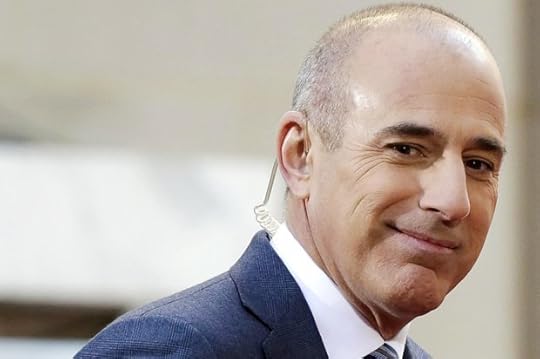
Matt Lauer (Credit: AP/Richard Drew)
Following his termination by NBC on Wednesday for the very generalized claims of “inappropriate sexual behavior,” Matt Lauer is now facing a series of much more specific allegations outlined in a blistering report published by Variety.
Most troublingly, the article by Ramin Setoodeh reports that a co-worker alleged Lauer gave her a “sex toy” as a gift, along with an “explicit note about how he wanted to use it on her, which left her mortified.” In addition, Setoodeh reported that on another occasion, Lauer “summoned a different female employee to his office, and then dropped his pants, showing her his penis. After the employee declined to do anything, visibly shaken, he reprimanded her for not engaging in a sexual act.”
Overall, the piece paints a disturbing portrait of what may have been going on behind the scenes at NBC News and the various network properties Lauer was attached to over the last 25 years. According to Setoodeh, multiple people said a current NBC employee met with network human resources Monday night in connection to a pattern of “inappropriate sexual conduct” that Lauer allegedly began during the Sochi Olympics in 2014.
Ten more current and former NBC employees claimed that Lauer has long made “lewd comments,” put women in embarrassing situations and engaged in consensual relationships within the NBC workforce. But, said one former NBC producer who worked with Lauer, “that’s still a problem because of the power he held . . . He couldn’t sleep around town with celebrities or on the road with random people, because he’s Matt Lauer and he’s married. So he’d have to do it within his stable, where he exerted power, and he knew people wouldn’t ever complain.”
For Lauer, Variety wrote, “work and sex were intertwined.”
Despite the producer’s claims that Lauer enjoyed safety within the NBC ranks, Variety reports that women did indeed complain about his behavior, constantly.
Several women told Variety they complained to executives at the network about Lauer’s behavior, which fell on deaf ears given the lucrative advertising surrounding “Today.” NBC declined to comment. For most of Lauer’s tenture at “Today,” the morning news show was No. 1 in the ratings, and executives were eager to keep him happy.
“Management sucks there,” a former network reporter told Variety. “They protected the shit out of Matt Lauer.”
That protection, it would seem, allowed Lauer to create somewhat of a dragon’s lair for his alleged predatory behavior. Wrote Setoodeh:
[Lauer’s] office was in a secluded space, and he had a button under his desk that allowed him to lock his door from the inside without getting up. This afforded him the assurance of privacy. It allowed him to welcome female employees and initiate inappropriate contact while knowing nobody could walk in on him, according to two women who were sexually harassed by Lauer.
There are other specific allegations in the piece, but Variety offers no names to support the allegations.
What is just as troubling as all of the accusations is the chilling effect Lauer may have had on NBC coverage of other cases of infidelity and sexual harassment. Variety reports that “Lauer — who had considerable editorial clout over which stories would ultimately air on ‘Today’— would frequently dismiss stories about cheating husbands.”
Setoodeh suggests this changed in recent months as the news cycle became dominated by continued accusations of sexual abuse against high-profile men. Still, one has to wonder how Lauer’s power as a newsmaker contributed to the air of permissiveness and the codes of silence only now being broken down by the wave of allegations that began with the twined exposés in The New York Times and The New Yorker on Harvey Weinstein.
Indeed, while the decision to pass on it happened at a higher level than Lauer’s, it’s worth remembering that it was NBC News that first killed Ronan Farrow’s report on Weinstein — the very one that was eventually published in The New Yorker, instigated the Times piece and thus began the still rolling avalanche of accusations against powerful men in the first place. And it was Lauer who allowed disgraced Fox News host Bill O’Reilly a platform to rehabilitate his image only months after career-crushing allegations of sexual harassment.
“You were probably the last guy in the world that they wanted to fire because you were the guy that the ratings and the revenues were built on. You carried that network on your shoulders for a lot of years,” Lauer told O’Reilly only two months ago.
What if?

The only existing model of the World Trade Center is displayed at the National Sept. 11 Memorial Museum, Wednesday, May 14, 2014, in New York. The museum is a monument to how the Sept. 11 terror attacks shaped history, from its heart-wrenching artifacts to the underground space that houses them amid the remnants of the fallen twin towers' foundations. It also reflects the complexity of crafting a public understanding of the terrorist attacks and reconceiving ground zero. (AP Photo) (Credit: AP)
“Of all manifestations of power, restraint impresses men most.” — Thucydides
You’ve heard the platitude that hindsight is 20/20. It’s true enough and, though I’ve been a regular skeptic about what policymakers used to call the Global War on Terror, it’s always easier to poke holes in the past than to say what you would have done. My conservative father was the first to ask me what exactly I would have suggested on September 12, 2001, and he’s pressed me to write this article for years. The supposed rub is this: under the pressure of that attack and the burden of presidential responsibility, even “liberals” — like me, I guess — would have made much the same decisions as George W. Bush and company.
Many readers may cringe at the thought, but former National Security Adviser and Secretary of State Condoleezza Rice has to be taken seriously when she suggests that anyone in the White House on 9/11 would inevitably have seen the world through the lens of the Bush administration. I’ve long argued that just about every Bush-era policy that followed 9/11 was an unqualified disaster. Nevertheless, it remains important to ponder the weight piled upon a president in the wake of unprecedented terror attacks. What would you have done? What follows is my best crack at that thorny question, 16 years after the fact, and with the accumulated experiences of combat tours in Iraq and Afghanistan.
Taking it personally
9/11 was an intimate affront to me. It hit home hard. I watched those towers in my hometown burn on televisions I could glimpse from my plebe (freshman) boxing class at West Point. My father worked across Church Street from Manhattan’s World Trade Center. Only hours later did I learn that he’d safely escaped on the last ferryboat to Staten Island. Two uncles – both New York City firemen — hopelessly dug for comrades in the rubble for weeks. Stephen, the elder of the two, identified the body of his best friend, Captain Marty Egan, just days after the attacks.
In blue-collar Staten Island neighborhoods like mine, everyone seemed to work for the city: cops, firemen, corrections officers, garbage men, transit workers. I knew several of each. My mother spent months attending wakes and funerals. Suddenly, tons of streets on the Island were being renamed for dead police and firefighters, some of whom I knew personally. Me, I continued to plod along through the typically trying life of a new cadet at West Point.
It’s embarrassing now to look back at my own immaturity. I listened in as senior cadets broke the news of war to girlfriends and fiancées, enviously hanging on every word. If only I, too, could live out the war drama I’d always longed for. Less than two years later, I found myself drunk with another uncle — and firefighter — in a New York pub on St. Patrick’s Day. This was back when an Army T-shirt or a fireman’s uniform meant a night of free drinks in that post-9/11 city. I watched the television screen covetously as President Bush delivered a final, 48-hour ultimatum to Iraqi leader Saddam Hussein. I inhaled, wished for a long war, and gazed at the young, attractive lead singer of the band performing in that pub. She was wearing a patron’s tied-up New York Fire Department uniform blouse with a matching cap cocked to the side. It was meant to be sexy and oh-so-paramilitary. It might seem unbelievable now, but that was still my — and largely our — world on March 17, 2003.
By the time I got my “chance” to join America’s war on terror, in October 2006, Baghdad was collapsing into chaos as civil war raged and U.S. deaths were topping 100 per month. This second lieutenant still hoped for glory, even as the war’s purpose was already slipping ever further away. I never found it (glory, that is). Not in Iraq or, years later, in Afghanistan. Sixteen years and two months on from 9/11, I’m a changed man, inhabiting a forever altered reality. Two wars, two marriages, and so many experiences later, the tragedy and the mistakes seem so obvious. Perhaps we should have known all along. But most didn’t.
How to lose a war (hint: fight it!)
From the beginning, the rhetoric, at least, was over the top. Three days after those towers tumbled, President George W. Bush framed the incredible scope of what he’d instantly taken to calling a “war.” As he told the crowd at a Washington national prayer service, “Our responsibility to history is already clear: to answer these attacks and rid the world of evil.” From the first, it seemed evident to the president: America’s target wasn’t anything as modest as the al-Qaeda terrorist network, but rather evil itself. Looking back, this was undoubtedly the original sin. Call something — in this case, the response to the acts of a small jihadist group — a “war” and sooner or later everyone begins acting like warriors.
Within 24 hours of the attacks, the potential target list was already expanding beyond Osama bin Laden and his modest set of followers. On September 12th, President Bush commanded his national counterterror coordinator, Richard Clarke, to “see if Saddam did this . . . look into Iraq, Saddam.” That night, Secretary of Defense Donald Rumsfeld told the president and the entire cabinet, “You know, we’ve got to do Iraq . . . There just aren’t enough targets in Afghanistan . . . We need to bomb something else to prove that we’re, you know, big and strong . . . ”
Nonetheless, Afghanistan — and its Taliban rulers — became the first military target. Bombs were dropped and commandos infiltrated. CIA spooks distributed briefcases of cash to allied warlords and eventually city after city fell. Sure, Osama bin Laden escaped and many of the Taliban’s foot soldiers simply faded away, but it was still one hell of a lightning campaign. Expected to be brief, it was given the bold name Operation Enduring Freedom and, to listen to the rhetoric of the day, it revolutionized warfare. Only it didn’t, of course. Instead, the focus was soon lost, other priorities (Iraq!) sucked the resources away, venal warlords reigned, an insurgency developed, and . . . and 16 years later, American troop levels are once again increasing there.
Over the days, the months, and then the years that followed, the boundaries of the Global War on Terror both hardened and expanded. In his January 2002 State of the Union address, President Bush ominously included Iraq, along with Iran and North Korea (though he left out “liberated” Afghanistan), in what he called “an axis of evil.” Who cared, by then, that none of those countries had had anything to do with the 9/11 attacks? In a flash the president conflated all three in the public mind, ultimately constructing a self-fulfilling prophesy. Saddam would be toppled and Iraq occupied 15 months later and, had it not been for the ensuing chaos, Iran and North Korea might have been next. Unsurprisingly, both countries intensified their bellicosity and grew all the more interested in nuclear weapons programs.
So much followed the 9/11 attacks that it’s no small thing to sum up: the Patriot Act, warrantless domestic wiretapping, Guantánamo, Abu Ghraib, a Taliban resurgence, an Iraqi civil war, drones as global assassins, the Arab Spring, the overthrow of Libyan autocrat Muammar Gaddafi and the collapse of his country, the Syrian bloodbath, the worst refugee crisis since World War II, and that’s just to begin a list.
In short, U.S. policies have left the Middle East in chaos: perhaps a million dead, Iran empowered, and radical Islamists resurgent. Meanwhile, this country has become a garrison state, forever at war, its military budget doubled, its populace seemingly indifferent, and its warrior caste shattered — physically and mentally. Sixteen years have passed and Washington is no closer to its goal (whatever that was). Retired general David Petraeus, our nation’s prodigal “hero,” has now ominously labeled the Afghan War (and by implication the rest of the war on terror) a “generational struggle.”
Few, to be honest, even remember the purpose of it all. Keep in mind that Army recruits today were perhaps two years old on 9/11. And so it goes.
Lost opportunities
It didn’t have to be this way. Nothing about it was predetermined. Much of the necessary information – certainly the warning signs of what was going to happen that September 11th – were already there. If, that is, one cared to look. History is contingent, human beings have agency, and events result from innumerable individual decisions. The CIA, the FBI, and even the Bush administration knew (or should have known, anyway) that an attack of some sort was coming.
As the 9/11 commission report painfully detailed, none of those agencies collaborated in a meaningful way when it came to preventing that day’s attacks. Still, there were warnings ignored and voices in the dark. When Richard Clarke, counterterror czar and a Clinton administration holdover, requested through official channels to deliver an emergency briefing for Bush’s key foreign policy officials, it took four months just to arrange an audience with their deputies. Four more months elapsed before President Bush received a briefing titled, “Bin Laden determined to strike the U.S.” Unimpressed, Bush quickly responded to the briefer: “All right . . . you’ve covered your ass now.”
Barely more than a month later, the World Trade Center and the Pentagon were burning.
Whatever else it did, 9/11 presented the United States with an opportunity, a Robert Frost-like fork in a divergent path. And we Americans promptly took the road most traveled: militarism, war, vengeance – the easy wrong path. A broad war, waged against a noun, “terror,” a “global” conflict that, from its first moments, looked suspiciously binary: Western versus Islamic (despite Bush’s pleas to the contrary). In the process, al-Qaeda’s (and then ISIS’s) narratives were bolstered.
There was — there always is — another path. Imagine if President Bush and his foreign policy team had paused, taken a breath, and demonstrated some humility and restraint before plunging the country into what would indeed become a war or set of wars. There were certainly questions begging to be asked and answered that never received a proper hearing. Why did al-Qaeda attack us? Was there any merit in their grievances? How did bin Laden want us to respond and how could we have avoided just such a path? Finally, which were the best tools and tactics to respond with? Let’s consider these questions and imagine an alternative response.
Why they (really) hated us
Americans and their government were inclined to accept the most simplistic explanation for the terror attacks of 9/11. As George W. Bush would assure us all, Osama bin Laden and al-Qaeda just “hate us for our freedoms.” The end.
Something about the guilelessness of that explanation, which was the commonplace one of that moment, never quite seemed right. Human motivations and actions are almost always more complex, more multifaceted, less simpleminded than that. While Bush boiled it all down to “Islamic” fundamentalism, even a cursory look at bin Laden’s written declaration of “war” — or as he called it, jihad — demonstrates that his actual focus was far more secular and less explicitly religious than was suggested at the time. Couched between Koranic verses, bin Laden listed three all-too-worldly grievances with America:
The U.S. military had occupied bases in the vicinity of Saudi Arabia’s holy sites of Mecca and Medina. (Well . . . that had indeed been the case, at least since 1990, if not earlier.)
U.S.-imposed sanctions on Iraq had caused the deaths of hundreds of thousands of Iraqi children. (This was, in fact, a reality that even Secretary of State Madeleine Albright awkwardly acknowledged.)
America’s leaders had long favored Israeli interests to the detriment of Palestinian wellbeing or national aspirations. (A bit simplistic, but true enough. One could, in fact, stock several bookshelves with respected works substantiating bin Laden’s claim on this point.)
To state the obvious, none of this faintly justified the mass murder of civilians in New York and Washington. Nonetheless, at that moment, an honest analysis of an adversary’s motives would have been prudent. It might have warned us of the political landscape that bin Laden was beckoning us — in his own bloody, apocalyptic fashion — to enter. In addition, as journalist Stephen Glain astutely observed, “By obscuring the real motives behind the attacks, Bush relieved the U.S. government of any responsibility for them.” This was a fatal error. While the overwhelming majority of Arabs and Muslims worldwide did not approve of bin Laden’s methods or his theology, much of his critique of Washington’s Middle Eastern policies was widely shared in the region.
Avoiding the Al-Qaeda script
Al-Qaeda’s leadership knew this perfectly well and they dangled it (and their suicidal acts) as a kind of bait, yearning for the sort of conventional U.S. military response that they knew would further inflame the Greater Middle East. Even in 1996, when journalist Abdul Bari Atwan interviewed bin Laden, the Saudi militant had expressed the desire to “bring the Americans into a fight on Muslim soil.” Only then, bin Laden surmised, could al-Qaeda buttress its argument, win converts from the apathetic Muslim masses, and — hopefully — bankrupt the United States in the bargain.
Suppose, for a moment, that President Bush had taken the high road, a path of restraint focused on twin tracks. First, he might have addressed broadly-shared Arab grievances, pledging a more balanced approach to the question of Israel and Palestine in his still-fresh administration, tailoring Iraq’s sanctions to target Saddam and his cronies rather than innocent citizens, and vowing to review the necessity of military bases so close to Mecca and Medina (or even the necessity of so many of the American bases that littered the region). He could have followed that with lethal, precise, targeted action by America’s intelligence, law enforcement, and Special Operations forces to hunt down and kill or capture the men actually responsible for 9/11, al-Qaeda’s leadership.
This manhunt needed to be ferocious yet measured in order to avoid the very quagmires that, 16 years later, we all know so well. Allies and adversaries would have had to be consulted and cautioned. Remember that, although al-Qaeda was disciplined and effective, on September 12, 2001, it remained diminutive in size and utterly marginal in its regional support. Dismantling its networks and bringing the true criminals of that day to justice never required remaking distant societies or occupying fragile nation-states with conventional military forces.
And keep in mind that such thinking about the situation isn’t purely retrospective. Take the Nation magazine’s Jonathan Schell. That October, after the invasion of Afghanistan had begun, appearing on the Charlie Rose show he called for “police work” and “commando raids,” but not war. He then prophetically observed:
“I think the question doesn’t revolve so much around the justification for war but about its wisdom, and I know that’s the question for me. I know that, from my point of view, terrorism is chiefly a political issue and secondarily a police issue and then, only in a very minor way, can it be addressed by military means and I think that, on the contrary, the war we’re fighting now will tend to worsen our problems. The question I ask myself is, at the end of the day, do you have more terrorists or do you have fewer and I think . . . today, right now, it looks like there are going to be more.”
Of course, at the time, just about no one in this country was listening to such voices.
A prudent president might also have learned from his father. Just as George H.W. Bush had meticulously constructed a broad international coalition, including all-important Arab states, to dislodge Saddam Hussein’s military from Kuwait in the Persian Gulf War, George W. Bush could have harnessed widespread international sympathy after the 9/11 attacks to blaze a judicious path. A new, broad, U.N.-backed coalition, which ought to have included several Muslim-majority nations, could have shared intelligence, rooted out jihadis (who represented a serious threat to most secular Arab regimes), and ultimately discredited al-Qaeda, dismantling its networks and bringing bin Laden himself to justice.
The right tools
Global sympathy — Russian President Vladimir Putin was the first world leader to call George Bush after the attacks — is as rare as it is fleeting. So that moment represented a singular and singularly squandered opportunity. The United States could have led a massive international effort, emphasizing law enforcement, not warfare, and including increased humanitarian aid, U.N.-sponsored peacekeeping operations, and a commitment to live America’s purported values by scrupulously avoiding crimes like torture and civilian casualties. Of course, it wouldn’t have been perfect — complex operations seldom are — but sober strategy demanded a rigorous effort.
One more imperative for the new campaign against al-Qaeda would have been garnering broad support and a legal sanction from Congress and the American people. Two weeks after 9/11, President Bush vapidly suggested instead that this country’s citizens should respond by getting in airplanes again and “enjoy[ing] America’s great destination spots. Get down to Disney World in Florida.” Instead, he might have steeled the population for a tough fight and inspired a new era of public service. Think: John F. Kennedy. Think: “Ask not what your country can do for you, but what you can do for your country.” Bush might have requested from Congress a narrow, targeted authorization for the use of military force rather than the rushed, expansive, open-ended sanction he actually demanded and received and that is still being used two administrations later to justify any acts against any group or country across the Greater Middle East and Africa.
He could have followed this with the presentation of a new National Service Act, rallying the young and incentivizing military or Peace Corps enlistment, infrastructure improvement, inner-city teaching, and various other kinds of public service. Imagine a new “Greatest Generation,” pulling together in a time of crisis. This, in retrospect, was a real opportunity. What a pity that it never came to pass.
It’s hard to know, of course, how such an alternate path might have played out, but honestly it would have been difficult to do worse. The U.S. remains stuck, spinning its wheels in regional conflicts and feeling no safer. The number of worldwide terrorist incidents has exploded since 2001. New Islamist groups were formed in response to U.S. actions and counteractions and they continue to spread without an end in sight.
I don’t know if there will be a next time, a chance to do it right. But should new threats emerge, more devastating attacks be endured, there simply has to be a better way, though the odds that President Donald Trump and his generals will find it are, honestly, next to nil.
Complex ideological threats sometimes demand counterintuitive responses. In such moments, hard as it may be to imagine, rational calculations should rise above the kneejerk emotional responses. True leaders step up and weather criticism in times of crisis. So next time, Americans would do well to set aside comforting illusions and take the world as it is, not as we imagine or wish it to be. The future may depend on it.
That future may well include new “terror” attacks on (or at least in) America’s cities. Expect this president to use those inevitable tragedies to stifle domestic dissent, escalate the ongoing wars, and — just maybe — fan the flames of nativism and white nationalism for petty political gain. The question is which institutions, which groups, will be prepared to fight back? I fear there’ll be few left willing to defy the tide of war. A generation born after 9/11 will vote in the next presidential election. They’ve never known peace. Will they even bother to demand it?
[Note: The views expressed in this article are those of the author, expressed in an unofficial capacity, and do not reflect the official policy or position of the Department of the Army, Department of Defense, or the U.S. government.]
Major Danny Sjursen, a TomDispatch regular, is a U.S. Army strategist and former history instructor at West Point. He served tours with reconnaissance units in Iraq and Afghanistan. He has written a memoir and critical analysis of the Iraq War, “Ghost Riders of Baghdad: Soldiers, Civilians, and the Myth of the Surge.” He lives with his wife and four sons in Lawrence, Kansas. Follow him on Twitter at @SkepticalVet.
Follow TomDispatch on Twitter and join us on Facebook. Check out the newest Dispatch Book, Alfred McCoy’s “In the Shadows of the American Century: The Rise and Decline of U.S. Global Power,” as well as John Dower’s “The Violent American Century: War and Terror Since World War II,” John Feffer’s dystopian novel “Splinterlands,” Nick Turse’s “Next Time They’ll Come to Count the Dead,” and Tom Engelhardt’s “Shadow Government: Surveillance, Secret Wars, and a Global Security State in a Single-Superpower World.”
Scientists genetically engineer a form of gluten-free wheat

(Credit: AP Photo/Orlin Wagner)
 A freshly baked roll is as delightful as a soft, fluffy cloud on a summer’s day. What gives bread much of its appealing texture is gluten, a group of proteins found in wheat, rye and barley. But in people with a serious autoimmune disorder called celiac disease, gluten damages the small intestine. Many others may have milder gluten intolerance and avoid foods that contain it.
A freshly baked roll is as delightful as a soft, fluffy cloud on a summer’s day. What gives bread much of its appealing texture is gluten, a group of proteins found in wheat, rye and barley. But in people with a serious autoimmune disorder called celiac disease, gluten damages the small intestine. Many others may have milder gluten intolerance and avoid foods that contain it.
Most gluten-free bread is made from alternative flours such as rice or potato, so it tastes and feels different from wheat bread. Now, however, researchers say that they have found a way to genetically engineer wheat that contains far less of the most troublesome type of gluten — but still has other proteins that give bread its characteristic taste and springiness.
Genetically modified crops are the subject of fierce debate around the world; some countries, including France and Germany, outlaw their cultivation. The biggest concern involves the practice of inserting DNA from one species into another, says Francisco Barro, a plant biotechnologist at the Institute for Sustainable Agriculture in Spain. To avoid this genetic crossover, Barro and his colleagues used the gene-editing technique CRISPR/Cas9 to cut selected genes from a wheat genome.
Their study zeroed in on alpha-gliadins, gluten proteins believed to be wheat’s major troublemakers in the immune system. The researchers designed bits of genetic material that directed the scissorlike Cas9 protein to cut out 35 of the 45 alpha-gliadin genes. When the modified wheat was tested in a petri dish, it produced an 85 percent weaker immune response, the team reported online in September in Plant Biotechnology Journal.
Wendy Harwood, a crop geneticist at the John Innes Center in England, who was not part of the study, notes that the engineered wheat has a ways to go before it can be turned into anything marketable. “I don’t think it’s the end of the story,” she says. “This is just a really important step in maybe producing something that is going to be incredibly useful.” To develop a completely safe strain of wheat for celiac patients, the researchers may need to target more of the gluten genes. Barro says his team is working on that.
Why aren’t Dems raising hell to oppose GOP Tax Bill?
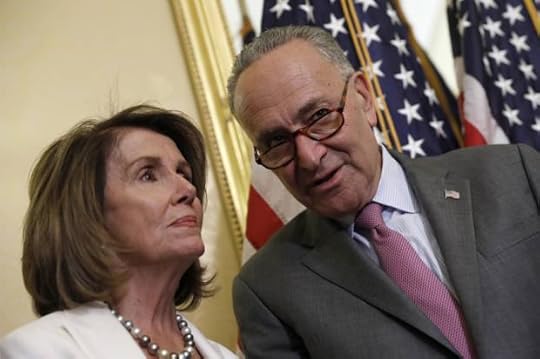
Nancy Pelosi, Chuck Schumer (Credit: Getty/Aaron P. Bernstein)
Let me offer a theory about why Democrats in Congress are not going after the Republicans’ worst tax bill ever with the same visceral vehemence they used to oppose the GOP’s efforts earlier this year to gut Obamacare and Medicaid.
The House and Senate versions of the bill, while differing in some particulars, have been parsed by the country’s best fiscal analysts, and as longtime tax policy investigative reporter David Cay Johnston noted, “share the same basic feature: huge tax savings for big business and the rich, while more than half of Americans may see their income taxes rise between now and the end of 2027. You can read solid analyses by three organizations with track records for accuracy in their tax and spending estimates here, here and here.”
So why are the Democrats not making more noise about a giant reverse-Robinhood scheme, that at least on the Senate side, also includes moves to gut Obamacare by ending the tax penalty for not carrying health insurance. If passed, that provision would allow millions to drop their coverage, which in turn, would raise premiums for everyone else. Remember how last summer Dems rose in the House and Senate to remind Republicans that tens of thousands of voters in their districts would lose their healthcare?
The answer — and it’s a theory, but one honed from covering national politics — is too many Democrats across Congress are still beholden to wealthier constituents, whether individuals who contribute to their campaigns, corporate employers who threaten to leave if they don’t get more corporate welfare, or people in their social circles who get invitations to Kennedy Center galas.
Whatever is really going on in the minds of individual Democratic members of Congress — which might include shoehorning in giveaways for local constituents — there is a growing sense that the opposition in Washington is not being so loyal to mainstream America, which they like to think they are defending. The question is, why?
New York Times op-ed columnist Paul Krugman has noted that Republican talking points about middle-class tax breaks are not just flat-out lies, but have been the standard flat-out lie we’ve heard for years. Perhaps that reality is numbing Democrats.
“Top-down class warfare, coupled with false claims to be cutting taxes on the middle class, has been standard G.O.P. operating procedure for a long time,” Krugman wrote two weeks ago. He continued:
“In fact, for policy wonks of a certain age, the current tax debate inspires an overwhelming sense of déjà vu, because many of the tricks Republicans are using come right out of the Bush administration’s playbook in 2001 and 2003. Tax breaks that phase in or out to make the 10-year budget impact look smaller? Check. Misleading examples and calculations to give the false impression of a tax cut for the middle class? Check. Pretending that tax cuts come free, that they won’t eventually have to be offset by cuts to popular programs? Check, again.”
But there’s something deeper and more nefarious going on this time around, Krugman observed, which makes the current GOP tax proposals anything but business-and-lying-as-usual.
“This time around, much more clearly than before, the goal seems to be to favor wealth, especially inherited wealth, over work. And buried in the legislation are multiple measures that would make it much harder for the children of the middle and working classes to work their way up,” Krugman said, citing examples.
“Suppose that a child from a working-class family decides, despite limited financial resources, to attend college, probably taking out a loan to help pay tuition. Well, guess what: Under the House bill, that interest would no longer be deductible, substantially raising the cost of college. What if you’re working your way through school and your employer contributes toward your education expenses? The House bill would make that contribution taxable income.”
The list doesn’t stop there. You get the point. But we’re not hearing many Democrats demand any reform be progressive, to drive the point home that progressive tax policy could fairly support many needed policies and programs. If that’s too abstract, then maybe Democrats should be shouting in the name of not burdening and hampering the next generation to pay for today’s excesses.
Whatever the reason or reasons, a larger point appears. This quandary has been noted on off-the-record list-servs where insiders talk freely about politics and policy. Why aren’t Democratic leaders raising more hell about the worst GOP tax plan ever? Why aren’t they doing more to stop a juggernaut from getting closer to passing, one that panders to those who don’t need more money at the expense of future generations? Why are so many Democrats acting like the majority of Republicans?
# # #
Steven Rosenfeld covers national political issues for AlterNet, including America’s democracy and voting rights. He is the author of several books on elections and the co-author of Who Controls Our Schools: How Billionaire-Sponsored Privatization Is Destroying Democracy and the Charter School Industry (AlterNet eBook, 2016).
November 28, 2017
Trump’s wooing works: Republican tax plan clears major hurdle
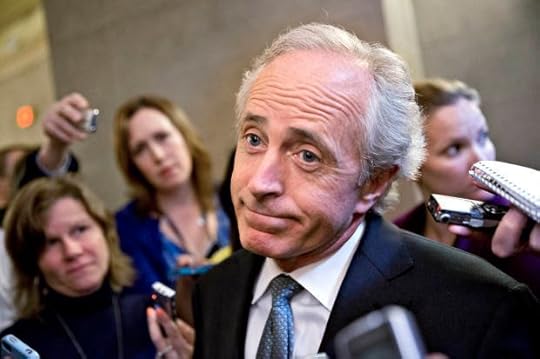
FILE - In this Oct. 11, 2013 file photo, Sen. Bob Corker, R-Tenn., speaks to reporters on Capitol Hill in Washington. Corker, chairman of the Senate Foreign Relations Committee, removed himself Wednesday, July 6, 2016, from consideration as Donald Trump's vice-presidential running mate. (AP Photo/J. Scott Applewhite, File) (Credit: AP)
Donald Trump hasn’t lost his grip on Republicans.
After a lunchtime visit and pep talk by the president on Tuesday, reluctant Republicans rallied to provide Trump with enough votes to move along his radical tax plan. Several key Republicans who had either expressed deep reservations or outright disapproval of the deficit-busting bill walked out of their meeting with Trump with altered views.
“I believe that a lot of my concerns, it appears, are going to be addressed and that I’m going to be getting the opportunity to offer amendments on the Senate floor,” said Sen. Susan Collins, R-Maine, whose constituents disapprove of the tax plan by 53 percent to 22 percent, according to a recent poll, in an interview with the New York Times.
Collins had previously criticized Trump’s plan to use the tax cuts to gut the Affordable Care Act’s individual mandate. Although Maine recently passed a statewide expansion of Medicaid by a wide voter margin, on Tuesday she appeared satisfied with Trump’s promise to stabilize markets after the initial spike in prices that repealing the individual mandate is likely to cause.
Sens. Ron Johnson, R-Wis., and Bob Corker, R-Tenn., who had both been holding out for more concessions from the White House, voted for the tax bill in a party-line vote on the Senate Finance Committee. Perhaps the holiday season has left the divided party feeling more familial, or the prospect of failing to pass one major piece of legislation despite complete control of government seems has scared enough Republicans into backing the bill, at least for now.
“My primary issue is pass-throughs,” Johnson — who just last week said he couldn’t support the plan — told the Times after Trump’s visit. “The good news is everybody agrees it’s a problem, it has to be fixed. I just keep getting assurances it’s going to be fixed, I just want to see how.” The former businessman, along with Sen. Steve Daines, R-Mont., have complained that the wealthiest small business owners will pay a higher tax rate than the wealthiest corporations under the GOP plan. Under the Senate plan, pass-through businesses get a roughly 20 percent reduction, while corporations get a 42 percent reduction.
Corker, who has already announced plans to retire from the Senate, had remained a stringent deficit hawk up until Trump’s visit on Tuesday. After that, however, the Tennessee senator said that he and Trump had “come to a pretty acceptable place, from my standpoint.”
In essence, Johnson, Daines and Corker — the major obstacles facing the White House’s last hope for legislative success in Trump’s first year — had only opposed the bill because it didn’t reduce taxes enough and the cuts to pay for them aren’t drastic enough. What Trump told them to win them over remains to be seen. But as I noted earlier on Tuesday, he seems prepared to sacrifice his own base in exchange for a year-end win.
Republicans’ slim majority in the Senate means they can afford to lose no more than two votes from their caucus and Tuesday’s committee vote sets up the bill up for a full Senate vote by the end of this week. To sell the politically toxic bill (the second-most unpopular in 30 years), Trump has taken to promising so-called welfare reform, which his White House has already signaled will mean targeting entitlement programs like Social Security and Medicare.
None of the Republican senators who have expressed varying degrees of concern with the GOP tax plan have mentioned thus far that the bill constitutes a major redistribution of wealth from the American middle class to the already wealthy.
TV star Susie Meister: My reality is our tragedy
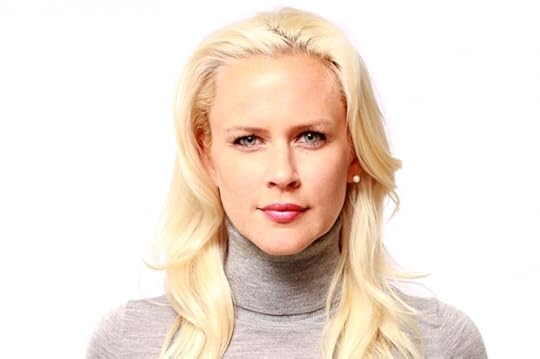
Susie Meister (Credit: Adam Butler)
Three and a half years ago, I wrote about my participation on MTV’s hit reality shows, “Road Rules” and “The Challenge” and the misogyny portrayed on camera and hidden behind the scenes. I grappled with how appearing on the programs made me complicit in the perpetuation of the genre’s negative impact. At that time, I knew reality television had contributed to a cultural callousness and fed the appetite of the lowest common denominator, but even I couldn’t have predicted that just a few years later one of the genre’s “stars” would become President or a light would be shone on the Hollywood boys’ club that lay beneath the surface all along.
Perhaps we should have seen it coming. By the time Trump ran for office, the public had been trained to expect shocking behavior from the people on their screens. We had grown accustomed to name-calling, aggression and dishonesty from our favorite reality stars. And Trump ran a campaign straight out of the reality TV playbook, which previously would have, by popular acclamation, made him unfit for office. His leaked comments about grabbing women “by the pussy,” erratic debate performances and manic Twitter habit seemed to make Trump better suited for the WWE than the Oval Office. But the public couldn’t look away, and after the dust settled, his victory left many asking, “How did this happen?”
While there is no simple answer, part of it surely is reality television.
I appeared on seven seasons of MTV reality shows, and often refer to my relationship with the genre as an abusive one. I knew I was participating in something unsavory, but I kept coming back for more. I focused on the positive aspects of participation like financial gain and free travel, and I convinced myself the good outweighed the bad. I loved the adrenaline rush from the competitions, the ability to meet people from all walks of life and, of course, the attention I received for being a part of a pop culture phenomenon. But I watched as producers consistently favored, coddled and excused male cast members’ behavior. They were treated with a wink of the boys-will-be-boys variety, and to complain meant being marginalized, at risk of receiving a “bad edit” and almost certainly relegated to the where-are-they now category of the Hollywood Z-list.
Women on “The Challenge” are routinely subjected to sexual aggression, unwelcome nudity and unwanted touching by their male cast mates. I certainly was, but complainers are reminded that if you don’t like it, there is a long line of people who would gladly take your place in the house. The prevalence of alcohol, and the way its consumption is encouraged by producers, creates an environment that is ripe for abusive behavior. The men who binge drink and engage in bloody brawls are rewarded with invitations to return as “all-stars,” while women who behave similarly are referred to as “crazy.” When a male cast member drunkenly climbed into my bed and refused to leave, I struck him, and while I was allowed to remain on the show, several cast members told me I should not come on these shows if I don’t want to “party.” I was seen as the problem rather than the inebriated, overzealous man who got into my bed without an invitation. But the moment I truly realized the misogyny was pervasive was while filming “The Ruins” season of the show.
Many of the men in the house referred to female cast and crew members as sluts and whores (in place traditional of terms of endearment), would routinely smack our behinds, place their faces in our crotches as a “joke” and mercilessly mock us for any perceived inadequacies. Several cast members were sent home due to violence, but all the men who were dismissed have since returned for subsequent seasons. The gender-based abuse was constant and made worse by the show’s insistence that the bedrooms and bathrooms be co-ed. Demanding that the high jinks stop would squelch your reality career (however limited it may be) and the entire purpose of the show: creating drama. Play the game or hit the showers.
On “The Challenge,” women are often merely accessories to the heroes (usually white, straight men). We are used for fodder, hook-ups and tension while the men get the glory. We are essentially the cheerleaders to the male cast members. We are there to look cute, provide spirit and prop up the bro stars. We are the soul of the show, while it steals ours. On set (which is also our house), male cast members walk around naked, pull off bikini tops and critique the women’s bodies. However, objecting to the mistreatment is seen as a betrayal of an unspoken agreement. The cast is expected to subject themselves to abuse in return for fifteen minutes of fame, sixteen if you’re lucky.
You tolerate microaggressions and macroaggressions as a normal condition of employment, to the delight of millions of viewers — and you wonder why we have problems behind closed doors, in board rooms or congressional offices? Like a frog slowly being boiled, I tolerated behavior I wouldn’t normally because it grew subtly over time. Reality television producers have been forced to up the ante to continuously provide increasingly scandalous content, which worsened the conditions for the cast over the years. The longer I participated, the more toxic behavior and egregious practices I endured. And instead of being punished for their transgressions, male cast members, in particular, reaped rewards. Shock jock-style sexual harassment didn’t earn male cast members a red card or penalty flag; it got their clips on shows like “The Soup” and helped them build their Instagram followings.
Fear of retribution for blowing the whistle and guilt for being a part of the genre to begin with contributed to my sense that this relationship was unhealthy. Despite these misgivings, I spent fifteen years in the cycle of shows, tolerating what can only be described as a hostile work environment in the name of entertainment and convincing myself this was the price of making it in show business. I wanted to be a star, or at least a semi-star, and the price of semi-stardom was complicity. I was treated like crap at times, but I felt that was my part of the bargain: shut up and take it.
It’s been seven years since my last show, and throughout that time I have been open about the ugly side of reality TV. While I did not receive the fanfare (or the scorn) that many of the #MeToo accusers have received, my message is the same. I feel connected to the stories revealed recently by women (and some men) who were silenced as men abused their positions of power and notoriety — particularly in the entertainment industry. The victims’ feelings of guilt, shame and frustration ring true for me as well. I wonder what might be different if I had protested louder as the show’s conditions worsened or if I had refused to return unless changes were implemented.
But I am intimately familiar with the choice these people were forced to make between keeping the peace (and their careers) and standing up to a system where boys-being-boys meant men being abusive. I tried to make this point before, first in my Salon article and later in a detailed piece for Jezebel, but the news cycle wasn’t ready for that kind of harsh reality check. I spoke out, trying in my measured way to draw attention to the systems of power responsible for much of this sexual abuse, but I wasn’t the voice for these ears — not back in 2014, anyway. Perhaps the Trump presidency was the catalyst necessary to convince the public that enough was enough. Or maybe the chorus of dozens of accusers made the sexual assault and harassment claims across industries impossible to ignore. But maybe the public isn’t quite ready, even now, to see the way the consumption of reality TV might be part of the problem.
People often dismiss reality TV as their “guilty pleasure,” but the ratings reflect a lot of “guilty” viewers. Millions of people are watching these shows and using them as a lens through which they see the world. Unfortunately, using the edited, soundtrack-ed lives of real people for entertainment has muddied viewers’ sense of (real) reality and virtue. Reality TV is a world where bad behavior is rewarded, hostility is encouraged, and aggression is incentivized. I realize now that it is also a reflection of a quiet, but pervasive cultural impulse. Brash, arrogant people like media kingpin Harvey Weinstein play to win, while the most vulnerable among us just get played — stuck with deep emotional and physical wounds to remind us that life isn’t a game.
In 2016, as Trump was elected and the Oxford dictionary declared “post-truth” the Word of the Year, it was clear that reality culture had permeated the boundary of our screens. Our collective preference to be entertained skewed our moral compass. Viewers were taught to value emotion, entertainment and exposure over rationality, reality and reticence. I spent nearly half of my life playing a heavily edited version of myself, never able to tell viewers the whole truth. I’m done with that; I now live and work in the sunshine, no longer willing to put fleeting celluloid popularity before my principles. There wasn’t a viral hashtag and social media campaign when I detailed the toxic nature of reality TV three and a half years ago, but the story is still the same. If we look closely, I suspect we’ll find other moments when women tried to tell us what was happening, and maybe we didn’t really grasp the pervasive and troubling nature of the boys club. And as women bravely come forward in Hollywood and elsewhere with accusations of assault, harassment and bullying, I stand with them, saying #MeToo.
Now we have a princess: Why a royal Meghan Markle matters
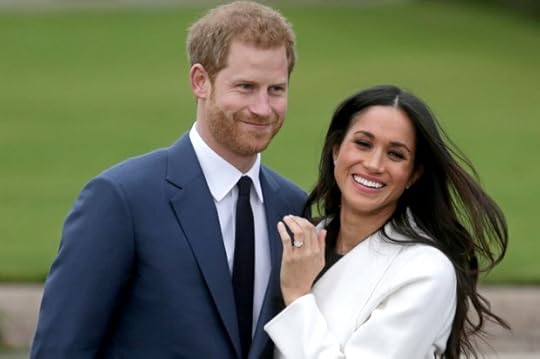
Prince Harry stands with his fiancée Meghan Markle as she shows off her engagement ring. (Credit: Getty/Daniel Leal-Olivas)
While waiting in the grocery store checkout line couple of months ago I idly picked up a tabloid with Meghan Markle and Prince Harry on the cover, one with the headline speculating about their engagement: the how of it, the when of it. I don’t recall which gossip rag was handling the story, but the audible snort from the black woman in line behind me was unforgettable.
“You know they’re never going to let that happen, right?” she scoffed, and by “they” she meant the British Royal family. I reminded her that when the British media coverage of Markle began taking on racist overtones, Kensington Palace took the unusual step of circulating an official statement that came to her defense. “Please,” my line companion crowed at a fellow sistah’s naivete. “That’s PR. They have to do that. But when it comes down to it, you watch — they’re never going to let that boy marry one of us.”
Forgive me for disagreeing with my colleague’s assessment yesterday that caring about Markle’s engagement to Prince Harry is optional and in the larger scheme of things, doesn’t matter much. I submit the above anecdote to prove why it does, and deeply. Maybe not to mainstream culture, for which the engagement represents the next step in a typical media feeding frenzy that’s been building ever since Meghan and Harry’s courtship went public. That coverage sped past tiresome some time ago.
But Markle, the Los Angeles-raised “Suits” actress is ascending to a level that millions of black women never thought to be attainable. Sure, Oprah teaches women of all backgrounds that we can achieve astronomical wealth without a man’s help. And for eight years Michelle Obama stood as an icon of poise and elegance as First Lady. These women worked extremely hard to attain their status, because that is what black women do.
The difference in Markle becoming true royalty, a bonafide princess, is that a British prince pursued her. A girl who grew up in Baldwin Hills, the daughter of a social worker — a former suitcase model on “Deal or No Deal,” for crying out loud — is set to become a legitimate Her Royal Highness because Prince Harry chose her.
You better believe that’s a big deal, even to those of us who ordinarily don’t care about what’s happening with the Windsors.
Question: Why do you think a number of black folks refer to the black women in their lives as “queens”? The unspoken understanding is that the majority white culture does not see us as such and never may.
For generations society has broadcast the message to black women that they are undesirable, unmarriable, lacking in femininity. You know, all the basic qualifications that would lead a prince — any prince, but especially a British royal — to seek out a meaningful relationship with a woman of color. This is drilled into African American girls from early childhood, when Disney first sinks its lacquered claws into America’s daughters.
The Disney franchise exists as a fantasy version of European monarchies, and the only one of those that truly matters to Westerners is Britain’s. Hence our continued fascination with the late Princess Diana and her children Harry and Prince William, the future king. William’s wedding to Kate Middleton charmed the world because Kate was a commoner. Why, that’s almost a Cinderella story.
From Snow White to Belle, for decades Disney princesses could have auburn, blonde or raven manes. They could even be half halibut. But until Jasmine came along in 1992 they were white. Disney crowned an Asian princess (“Mulan”) and a Native American one (“Pocahontas”) before finally introducing the first African American princess, Tiana, in 2009’s “The Princess and the Frog.”
This begins to explain the sensation of vicarious triumph some of us may be feeling at Markle’s engagement.
Coincidentally, it also brings to mind an essay Debra Dickerson wrote for Salon in 2005 about her conflicted reaction to the Vince Vaughn/Owen Wilson romp “Wedding Crashers.” Wondering why, in a montage of the heroes bedding an assortment of women at a variety of receptions they sneaked into, no African American women were represented, she explained how that spoke to the longstanding grief she and other black women.
“Our hearts are broken because we are unloved,” she wrote. “More than that: Black women are unlovable, or so the world tells us every day. Most often, it’s a sucker punch.” She goes on to add:
“Owen, Vince: We long for those things. It’s a misery to black women why our strength, the strength that kept our people from extinction and which holds the community together yet, makes us seem manly somehow, as if no white woman has ever roughened her pink hands or survived rape for her family’s sake. Or been a bitch . . . . Sisters are simply not seen as either ladylike or, to put it bluntly, fuckable. Rapeable, certainly, as the history of slavery and Jim Crow prove, just not fuckable.”
Or even dateable, frankly. Consider that in 2017, the year Harry put the ring on Meghan’s finger, American viewers received their first black “Bachelorette.” This was a huge deal for a contrived unscripted series that simulates the search for love and romance; rarely do contestants find the real thing.
So yes, it’s a big deal. At the same time, just because one of us moved on up to a deluxe 20-room apartment in Kensington Palace does not augur a meaningful social change. A few analysts have expressed hope that Harry and Meghan will set an example for Britain and aid the cause of furthering racial harmony. That’s far too much to put on one sweet and astronomically fancy marriage.
Then, look at everything black women at the highest levels of society have already been forced to endure. When she was First Lady, Obama sustained every stereotypical smear regarding black women that one could imagine. She was painted as an angry black woman. One cartoonist drew a caricature of her next to Melania Trump with a visible bulge at the front of her skirt. Tennis champion Serena Williams has dealt with sports commentators derisively calling her too masculine, while a commentator at the Australian Open compared her sister Venus to a gorilla.
Becoming a royal won’t save Markle from similar indignities; indeed, she can count on the escalation of such attacks once the inebriation of wedding planning ends. The world loves Harry, but he’s fifth in line to the throne and soon to be sixth. That makes Markle this generation’s lineage equivalent of Sarah Ferguson. If you’re old enough to remember how the British press did her, don’t forget: Ferguson is a white woman.
Already Britain’s Daily Mail cast Markle as a survivor of a “gang-scarred” neighborhood with a November 2016 headline that read, “Harry’s girl is (almost) straight outta Compton,” the very thing that resulted in Kensington Palace issuing that harsh official condemnation. With the press in British’s former favorite colonies joining in on the excitement, one can only expect the pre-wedding coverage from this point forward to be most positive.
What happens after the honeymoon will the real test of Markle’s mettle. As we know from news coverage, documentaries and Netflix’s “The Crown,” the life of a royal is no party, and that means the life of a black female royal is bound to come with extra challenges. Every move and expression of Markle’s will be scrutinized and interpreted; every misstep amplified as both the wife of a Windsor “spare” heir and a biracial woman — Markle’s mother is African-American, and her father’s heritage is Dutch-Irish.
But the actress wouldn’t have gotten to where she is now without knowing an essential truth of being a black woman, that it’s up to us to claim our self-worth and crown ourselves despite ugly messages bombarding us at every turn. The fact that she’ll be royalty likely matters less to her than how she feels about her Prince. What she symbolizes to women and little black girls everywhere, however, matters greatly.
Seems that boy is going to marry one of us after all. Good for her. And good for us.




